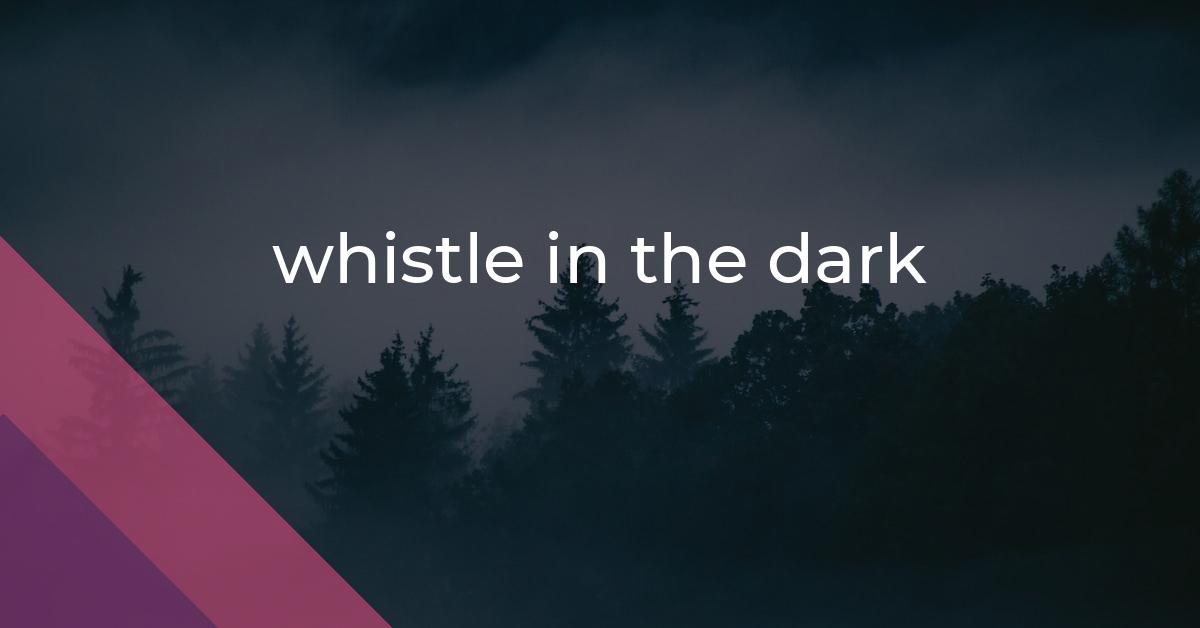whistle in the dark: Idiom Meaning and Origin
What does ‘whistle in the dark’ mean?
The idiom *whistle in the dark* means to pretend to be brave or optimistic in a difficult or frightening situation, often to hide one's fear or uncertainty.

Idiom Explorer
The idiom "wolf in sheep's clothing" refers to someone who appears to be harmless or gentle, but is actually dangerous or malicious.
The idiom "whistle for" means to expect or hope for something that is unlikely to happen or is not forthcoming.
The idiom "whistle Dixie" means to engage in self-delusion or excessive optimism about a situation that is unlikely to be successful or favorable.
The idiom "whisk away" means to quickly and unexpectedly take someone or something away from a place or situation.
The idiom "wet one's pants" means to involuntarily urinate due to extreme fear, excitement, or laughter. This phrase is often used figuratively to describe someone who is extremely scared, excited, or amused.
The idiom "wet one's beak" means to receive a share of profits or benefits, especially in a dishonest or unethical manner.
The idiom "weather the storm" means to endure or survive a difficult or challenging situation, often through perseverance and resilience.
The idiom "weasel out" means to avoid or escape from a situation, often through deceitful or cunning behavior.
Unveiling the Mystery: Introspecting a Phrase
Whistle in the dark is an idiom that has its origins in the superstitions and fears of ancient times. It encapsulates the human desire to ward off danger by making noise and giving the illusion of strength and confidence, even in the face of uncertainty and fear. This idiom took root in the English language and has been used for centuries to convey a sense of bravado, defiance, and an attempt to ward off evil or misfortune.
The phrase "whistle in the dark" is typically used when someone is trying to maintain a positive or optimistic attitude in a situation that is uncertain or potentially difficult. In this context, the act of whistling in the dark serves as a metaphor for putting on a brave face and appearing confident, even when faced with adversity or fear. It signifies an attempt to mask one's true emotions or vulnerabilities and project a façade of courage.
The etymology of this phrase reveals interesting connections to ancient belief systems and cultural practices. Whistling has long been associated with the idea of creating a protective shield or warding off evil spirits. In many cultures, whistling was believed to have the power to summon or communicate with spirits, gods, or other supernatural entities. The act of whistling, especially in the dark, was thought to provide protection against lurking dangers or malevolent forces.
Throughout history, the phrase "whistle in the dark" has been used in various literary and artistic works, reinforcing its metaphorical meaning. Writers and poets have used this idiom to express the mix of courage and vulnerability that can exist in individuals facing uncertain or potentially dangerous situations. It has become a common trope in literature, representing the resilience and determination of individuals who persevere in the face of adversity.
Today, "whistle in the dark" is still a widely recognized idiom, although its usage has shifted from its original supernatural connotations. It is now used more broadly to describe any situation where individuals attempt to maintain a positive outlook or display confidence despite their inner uncertainties. From personal challenges to societal or economic crises, the idiom is still employed to convey resilience, hope, and the determination to overcome obstacles.
+A related idiom to "whistle in the dark" is "whistle for". This phrase is often used to express the futility of waiting or hoping for something that is unlikely to happen. It conveys the idea of putting effort into something that is ultimately fruitless, akin to whistling and expecting a response in the dark. While "whistle in the dark" is about maintaining a positive attitude in the face of uncertainty, "whistle for" signifies the realization that one's efforts may not yield the desired outcome.
A further related idiom to "whistle in the dark" is "whistle Dixie". This idiom is commonly used to express the idea of wasting time or engaging in frivolous activities. It implies that someone is preoccupied with something unimportant or trivial, akin to whistling a merry tune while in a dark and serious situation. While "whistle in the dark" is about putting on a brave face, "whistle Dixie" signifies a lack of focus on what truly matters.
Another related idiom to "whistle in the dark" is "wolf in sheep's clothing". This phrase is used to describe someone who appears innocent or harmless on the outside but is actually cunning or malicious. It conveys the idea that things are not always as they seem, akin to whistling a cheerful tune in the dark while danger lurks nearby. While "whistle in the dark" is about projecting a façade of courage, "wolf in sheep's clothing" signifies the presence of hidden motives or deception.
Finally, a related idiom to "whistle in the dark" is "whisper campaign". This phrase is often used to describe a covert or malicious effort to spread rumors or damage someone's reputation. It conveys the idea of spreading gossip in a secretive manner, akin to whispering in the dark where others cannot see or hear. While "whistle in the dark" is about displaying courage, "whisper campaign" signifies the destructive power of words spoken in secrecy.
While the origins and specific usage of the idiom "whistle in the dark" can be traced back to ancient beliefs and literary traditions, its meaning continues to evolve and adapt to the modern world. The idiom captures the complex emotions and contradictory human nature, as individuals navigate the fine line between bravado and vulnerability. It serves as a reminder that even in the darkest times, humans have an innate capacity to face challenges head-on and find strength within themselves.
Example usage
Examples of how the idiom *whistle in the dark* can be used in a sentence are:
- She tried to be confident, but her laughter was just a whistle in the dark.
- After hearing a strange noise outside, he whistled in the dark to show he wasn't scared.
- Despite the challenging situation, the team leader continued to whistle in the dark, pretending everything was going smoothly.
More "Expression" idioms



